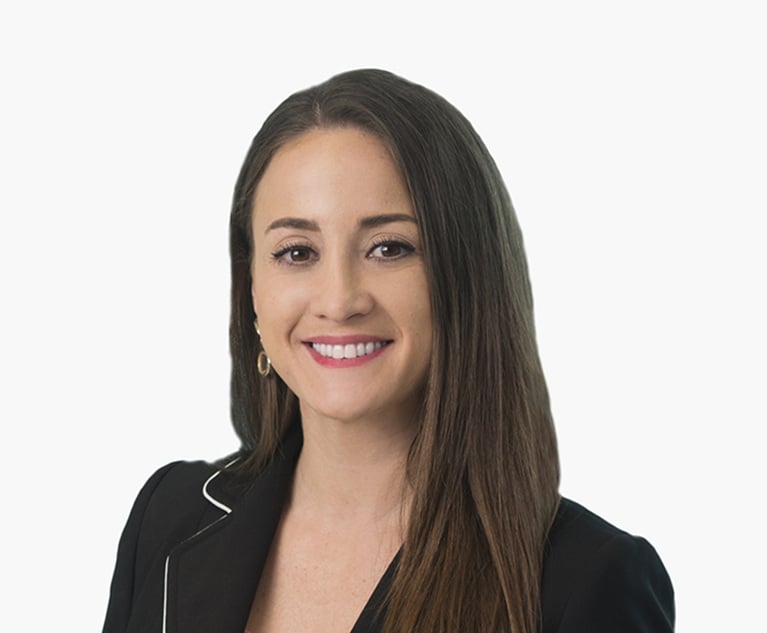Knight Foundation Gets Second Go at Arguing $1.5M Real Estate Grant Was Misused
The Third District Court of Appeal reversed the lower court and remanded the case to Miami-Dade Circuit Court.
May 24, 2018 at 03:01 PM
5 minute read

The John S. and James L. Knight Foundation is getting a second chance to argue its case alleging the misuse of $1.5 million given by the foundation for revitalization of Miami's struggling Overtown neighborhood.
The Third District Court of Appeal reversed the trial court and remanded the foundation's lawsuit claiming a nonprofit and several people misdirected the funds to purposes other than intended.
The foundation filed suit in Miami-Dade Circuit Court against Fort Lauderdale-based Urban Philanthropies Inc., which advocates for smart growth and civic entrepreneurship, the nonprofit's president Philip Bacon and some of its board members.
Defense attorney Christopher David, a partner at Fuerst Ittleman David & Joseph, said the money was spent as intended. He said his legal team will seek a rehearing in the Third DCA to point out things they say were overlooked in the opinion issued Wednesday.
“If the appellate court doesn't change its view, we are confident we will prevail at the trial,” he said.
David and colleagues Michael Kornhauser and Jeffrey Molinaro represent the defendants.
Bilzin Sumberg partner Michael Kreitzer, of cousel Michael Strauch and former associate James Ward represented the foundation on appeal.
Knight sued in December 2015, but this story traces back about 14 years before that.
The Miami-based foundation funding journalism, the arts and communities across the U.S. in June 2001 gave $3 million to the Collins Center for Public Policy Inc. for its Collaborative Overtown Transformation Project with the understanding that $1.5 million was to buy real estate in the neighborhood, records show.
The South Florida Smart Growth Land Trust Inc., established by the Collins Center to assemble land, through a subsidiary purchased 17 properties for $2.1 million and supplemented the grant with other financing, according to the foundation's 2016 amended complaint.
In 2013, 11 of the properties were transferred to Urban Philanthropies, according to the lawsuit. The following year, Urban sold these and other Overtown properties to Sea Level Properties/Lion Folk Life Village LLC for $5.3 million, according to the lawsuit.
After the sale, it's alleged Urban put $1.2 million in a Morgan Stanley investment account and $1 million in an annuity contract at Security Benefit Life Insurance Co.
Knight said this was improper use of its grant, in part because any other use of the money must be approved by the foundation. The foundation sought either the reestablishment of a trust to benefit Overtown or the return of its funds, according to the complaint. The lawsuit listed a breach of fiduciary duty, unjust enrichment and creation of a resulting trust counts.
Aside from Urban and Bacon, the foundation sued secretary Andrea Copeland, treasurer Karim Bryant and director Dale Landry.
The foundation asked for compensatory damages of more than $1.5 million, prejudgment interest, court costs as well as a constructive trust to be created with the invested money.
The defense attorneys maintained Smart Growth, the company formed to buy the Overtown property with the help of the grant, was a nonprofit rather than a trust.
“There were several different vehicles which you can use to gain control of the land, so you could dictate how that land would be developed,” David said. “One of those entities was a de facto land trust, which is a real land trust with a board of trustees, an actual trust that would hold the land and own it in perpetuity and lease it to other people and control it. The other one was a nonprofit corporation that would buy and sell the land.”
In the grant documents, the nonprofit option was picked, David argues.
This option allowed Smart Growth to buy and sell properties, take out mortgages and refinance them in pursuit of a neighborhood revitalization project, David said.
Miami-Dade Circuit Judge John Thornton granted the defense's motions for summary judgment in trial court, prompting the foundation appeal.
The three-judge appellate panel found unresolved issues of material fact needed to be resolved in trial court over whether a trust was formed.
“It is possible to reasonably interpret the alleged trust documents in this case in at least two ways. The first way supports the position advocated by the Knight Foundation, that these documents reflected that the Knight Foundation is the settlor in the creation of a charitable trust. The second way, advocated by the defendants, is that these documents only demonstrate that the Knight Foundation accepted an application for a charitable grant, and that they do not demonstrate the existence of a charitable trust,” Chief Judge Leslie Rothenberg wrote. Judges Barbara Lagoa and Thomas Logue concurred.
As for the properties bought with grant money, they now are part of the Miami Innovation District, which envisions 7 million square feet of development on 10 acres focused on entrepreneurship and innovation in the Overtown and Park West areas, according to the district's website.
Lion Folk Life, which bought 11 Overtown parcels from Urban, is affiliated with Miami Innovation developers Michael and Ronald Simkins, according to state records.
The project would include a tower with retail and restaurants, micro-apartments and other residences and offices, according to its website.
Foundation attorneys didn't return a request for comment on the court opinion. The foundation declined to comment, saying it doesn't speak about ongoing litigation.
This content has been archived. It is available through our partners, LexisNexis® and Bloomberg Law.
To view this content, please continue to their sites.
Not a Lexis Subscriber?
Subscribe Now
Not a Bloomberg Law Subscriber?
Subscribe Now
NOT FOR REPRINT
© 2025 ALM Global, LLC, All Rights Reserved. Request academic re-use from www.copyright.com. All other uses, submit a request to [email protected]. For more information visit Asset & Logo Licensing.
You Might Like
View All
About to Become a Partner? Here's What to Know About Your Newfound Wealth
10 minute read
Holland & Knight Hires Chief Business Development and Marketing Officer From EY
2 minute read
McDermott Welcomes Back Litigation Partner Following Stint With Miami-Dade County
3 minute read
Florida Bar Rolls Out Free Trust Accounting Software for All Its Members
3 minute readTrending Stories
- 16-48. It’s Comp Time Again: How To Crush Your Comp Memo
- 2'Religious Discrimination'?: 4th Circuit Revives Challenge to Employer Vaccine Mandate
- 3Fight Over Amicus-Funding Disclosure Surfaces in Google Play Appeal
- 4The Power of Student Prior Knowledge in Legal Education
- 5Chicago Cubs' IP Claim to Continue Against Wrigley View Rooftop, Judge Rules
Who Got The Work
Michael G. Bongiorno, Andrew Scott Dulberg and Elizabeth E. Driscoll from Wilmer Cutler Pickering Hale and Dorr have stepped in to represent Symbotic Inc., an A.I.-enabled technology platform that focuses on increasing supply chain efficiency, and other defendants in a pending shareholder derivative lawsuit. The case, filed Oct. 2 in Massachusetts District Court by the Brown Law Firm on behalf of Stephen Austen, accuses certain officers and directors of misleading investors in regard to Symbotic's potential for margin growth by failing to disclose that the company was not equipped to timely deploy its systems or manage expenses through project delays. The case, assigned to U.S. District Judge Nathaniel M. Gorton, is 1:24-cv-12522, Austen v. Cohen et al.
Who Got The Work
Edmund Polubinski and Marie Killmond of Davis Polk & Wardwell have entered appearances for data platform software development company MongoDB and other defendants in a pending shareholder derivative lawsuit. The action, filed Oct. 7 in New York Southern District Court by the Brown Law Firm, accuses the company's directors and/or officers of falsely expressing confidence in the company’s restructuring of its sales incentive plan and downplaying the severity of decreases in its upfront commitments. The case is 1:24-cv-07594, Roy v. Ittycheria et al.
Who Got The Work
Amy O. Bruchs and Kurt F. Ellison of Michael Best & Friedrich have entered appearances for Epic Systems Corp. in a pending employment discrimination lawsuit. The suit was filed Sept. 7 in Wisconsin Western District Court by Levine Eisberner LLC and Siri & Glimstad on behalf of a project manager who claims that he was wrongfully terminated after applying for a religious exemption to the defendant's COVID-19 vaccine mandate. The case, assigned to U.S. Magistrate Judge Anita Marie Boor, is 3:24-cv-00630, Secker, Nathan v. Epic Systems Corporation.
Who Got The Work
David X. Sullivan, Thomas J. Finn and Gregory A. Hall from McCarter & English have entered appearances for Sunrun Installation Services in a pending civil rights lawsuit. The complaint was filed Sept. 4 in Connecticut District Court by attorney Robert M. Berke on behalf of former employee George Edward Steins, who was arrested and charged with employing an unregistered home improvement salesperson. The complaint alleges that had Sunrun informed the Connecticut Department of Consumer Protection that the plaintiff's employment had ended in 2017 and that he no longer held Sunrun's home improvement contractor license, he would not have been hit with charges, which were dismissed in May 2024. The case, assigned to U.S. District Judge Jeffrey A. Meyer, is 3:24-cv-01423, Steins v. Sunrun, Inc. et al.
Who Got The Work
Greenberg Traurig shareholder Joshua L. Raskin has entered an appearance for boohoo.com UK Ltd. in a pending patent infringement lawsuit. The suit, filed Sept. 3 in Texas Eastern District Court by Rozier Hardt McDonough on behalf of Alto Dynamics, asserts five patents related to an online shopping platform. The case, assigned to U.S. District Judge Rodney Gilstrap, is 2:24-cv-00719, Alto Dynamics, LLC v. boohoo.com UK Limited.
Featured Firms
Law Offices of Gary Martin Hays & Associates, P.C.
(470) 294-1674
Law Offices of Mark E. Salomone
(857) 444-6468
Smith & Hassler
(713) 739-1250






